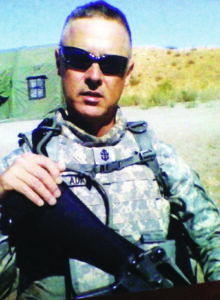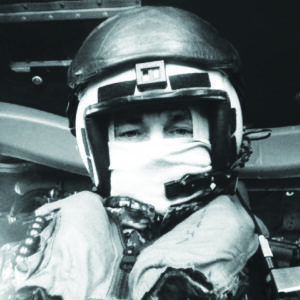
by John Dowd
Veterans Day is about honoring those who have served and remembering the sacrifices service members have made in the line of duty. For Blakney Adams, of Stevensville, his service was a way of life. He retired, changed both physically and mentally by the sacrifices he and others made, and by a respect for his country that grew to even more than he started with.
Adams was a combat engineer and military police officer for the U.S. Navy, with a broken service record, meaning he had space in between where he was a civilian. During that break, he was a police officer in Stevensville. He participated and fought in three different wars and has traveled to numerous countries. In total, his military service lasted 22 years. And, after all that service, five days after he retired, he was diagnosed with a rare and terminal form of Leukemia.
When asked why he served, Adams explained without hesitation, “because I love this country.”
Adams joined the U.S. Navy when he was 19, in the early 1980’s. He had grown up in Montana, around the Missoula and Ravalli County areas. He believes he had a lot of patriotism instilled into him early on, and saw firsthand, through his service, the value that had. He specifically sought to join the U.S. Navy because he wanted to get out and see the world. He assumed he would spend his time on a ship, going somewhere new every few months. But that is not really what happened.

In much of his service, Adams was a “CB,” or combat engineer. These are the people that often find themselves in the middle of nowhere, under fire, constructing things at high speed and with great efficiency. They also act as reconnaissance and participate in a host of military activities. Adams was primarily a heavy equipment operator and was also what he likes to call, “naval infantry.” He carried much of the same equipment that Marines did, and performed in numerous operations in his career. He was trained in explosives, and even spent time in the famous 29 Palms Marine base, the largest of its kind in the world.
Adams described his job, explaining how they are often called to do things like go out into the middle of nowhere and put up an airfield in 48 hours or less, then get planes landing and taking off within that time. They often did this under fire and in inhospitable landscapes.
“To me, this was just my job,” said Adams. He never thought about what they were doing as something that unusual, and he never kept track of medals or anything like that. The one thing he was especially proud of was that he never lost anyone from his crews. “I was very fortunate to have brought all my people back,” said Adams. However, that doesn’t mean they never came close, and they were often surrounded by death, both friends and enemies.
The first time he can remember really being at war was in Somalia, off the coast, chasing after pirates. He said they were everywhere, and danger was often close. They would be sent out on patrol for 30 to 60 days and would sometimes act as security for ships traveling through the area. One time he can recall, they had two Iranian gunships approaching the ship they were on. For him, that was one of the closest times he has come to really losing a lot of people. He gave the order for his men to go out and “sweep the decks.” However, luckily, he believes the gunboats had not counted on him and his men being there. As soon as they came out, the gunboats veered off, turning the story from tragedy to a really close call.

Another time, he remembers being stationed at a Forward Operating Base (FOB) outside of Fallujah, Iraq. Their mission was to apprehend numerous targets, interrogate them and turn them in to the Iraqi Police (IP) if they were wanted by the IP. This was at the end of the second battle of Fallujah. He said they got all but one.
Most soldiers were supposed to get a certain amount of decompression time. However, he never got that. Adams’ career often saw him rocketed from one assignment to another, for years on end. After six tours, it started to get to him in ways he did not yet understand. That is, until the PTSD (post-traumatic stress disorder) caught up with him.
He was working in Yorktown, working with a special effects company to train others on working around motors. After hearing them go off, they were so realistic, that his body would act on its own, over and over again. Hitting the deck, other soldiers thought he was simply showing them how to react to the fire. He wasn’t. After feeling embarrassed, he simply walked off. He checked himself in and started a year-long process to try to get a handle on a growing problem. During that time, a doctor told him that his was “one of the worst cases of PTSD she had ever seen.”
Eventually, he retired. Only five days later, he was told he had cancer, and that was it. He said he just laughed. For him, that seemed like the only reaction he could have. He even knew exactly where he had gotten the cancer. In Somalia, he had a pipe of Benzene-laced gasoline spray on him. After getting soaked, all over his body, in his eyes, mouth and on his face, he left to shower. He said his body felt numb and he knew something was wrong. That was eight or so years prior.
After numerous severe rounds of chemotherapy, he surprised his doctors and nurses by the sheer amount of pain he could withstand, and always kept a positive attitude.
“I don’t give up. I refuse to give up,” said Adams. After all the hardships in life and in his service, fighting cancer, bone marrow transplants, and dying twice, he just would not stop.
For Adams, it comes down to the lessons he learned in life and from the “old school” people of Montana. “They are a hard people, and hard workers.” Adams said these lessons helped him to keep his spirits up and to take life head-on. They are what he credits for helping him eventually beat cancer, and everything else.
He lives with permanent Graft-Versus-Host-Disease (GVHD), where his body often rejects the marrow that was transplanted. “My body is still trying to kill me,” Adams joked. He cannot do as much as he used to, and he lives in near constant difficulty, he suffers extreme pain and cramps often, his nerves affect him poorly after he was blown up and his memories are often hard to escape. But when asked about his service, he said without regret or pause, “I would do it all over again.”
According to Adams, people need to enjoy every day. They also need to know how fortunate they are to live in this country.
“Quit hating each other, and get a perspective from somebody that doesn’t live here,” said Adams. “This country is the only one of its kind. I’ve been to most of them, the good and the bad, and none even come close.”
He added, through all the terrible stuff he has seen and experienced, he believes people should fight to preserve the freedoms they have here with a passion.
Today, Adams is a little reclusive and humble of his service, just like many service men and women. For Adams, family is the most important thing that can never be replaced, and that extends past blood.
He does not care how anyone lives their life, he passionately believes it is their freedom to do so, and he cherishes that above all else. However, he tells people, “you have that right because of the sacrifices other people have made.” For Adams, that should never be forgotten.